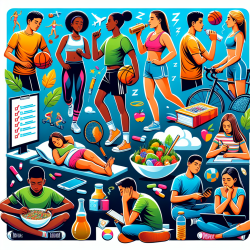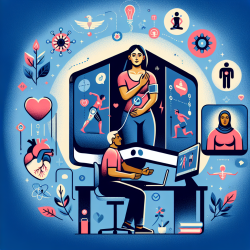Introduction
In the realm of adolescent health, the concept of Health-Related Quality of Life (HRQoL) is pivotal. It encompasses physical, psychological, and social well-being, offering a holistic view of health. A recent study titled "Association between Lifestyle Behaviors and Health-Related Quality of Life in a Sample of Brazilian Adolescents" provides valuable insights into how various lifestyle behaviors impact HRQoL in adolescents. This blog aims to guide practitioners in leveraging these findings to enhance their practice and outcomes for children.
Key Findings from the Study
The study evaluated 739 adolescents from Brazil, assessing their lifestyle behaviors and HRQoL using the Kidscreen-10 instrument. The results revealed significant associations between certain lifestyle behaviors and HRQoL:
- Sports Participation: Engaging in sports was positively associated with better HRQoL.
- Processed Food Consumption: Higher intake of processed foods was linked to lower HRQoL.
- Screen Time: Working on screen devices for more than 4 hours a day was negatively associated with HRQoL.
- Drug Experimentation: Adolescents who had experimented with illicit drugs reported lower HRQoL.
- Sleep Duration: Sleeping less than 8 hours per night was associated with reduced HRQoL.
Implications for Practitioners
For practitioners working with adolescents, these findings underscore the importance of a multi-faceted approach to improving HRQoL. Here are some actionable strategies:
- Promote Sports and Physical Activity: Encourage regular participation in sports, which has been shown to enhance HRQoL independently of other lifestyle factors.
- Advocate for Healthy Eating: Educate adolescents and their families about the benefits of reducing processed food intake and opting for healthier, unprocessed alternatives.
- Manage Screen Time: Work with adolescents to set limits on screen time, particularly for work-related activities, to ensure a balance between work and leisure.
- Address Substance Use: Implement preventive measures and interventions to reduce drug experimentation and use among adolescents.
- Ensure Adequate Sleep: Educate adolescents on the importance of getting 8-10 hours of sleep per night to support overall well-being and HRQoL.
Encouraging Further Research
While the study provides valuable insights, it also highlights areas for further research. Practitioners are encouraged to explore the complex interactions between various lifestyle behaviors and HRQoL. Longitudinal studies and interventions targeting multiple behaviors could offer deeper understanding and more effective strategies for improving adolescent health.
To read the original research paper, please follow this link: Association between Lifestyle Behaviors and Health-Related Quality of Life in a Sample of Brazilian Adolescents.










